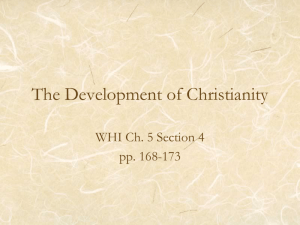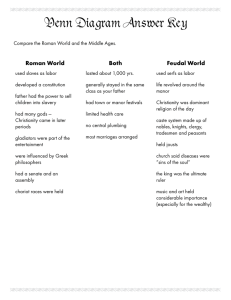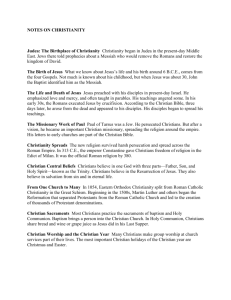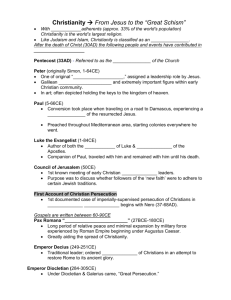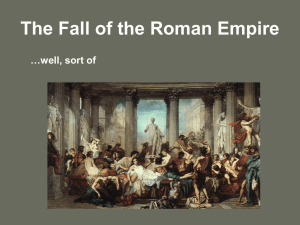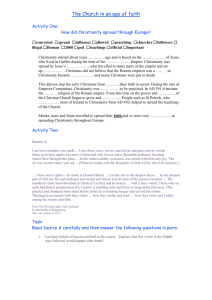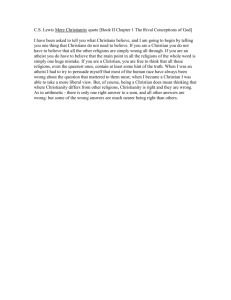Christianity and Rome - World History with Miss Bunnell
advertisement
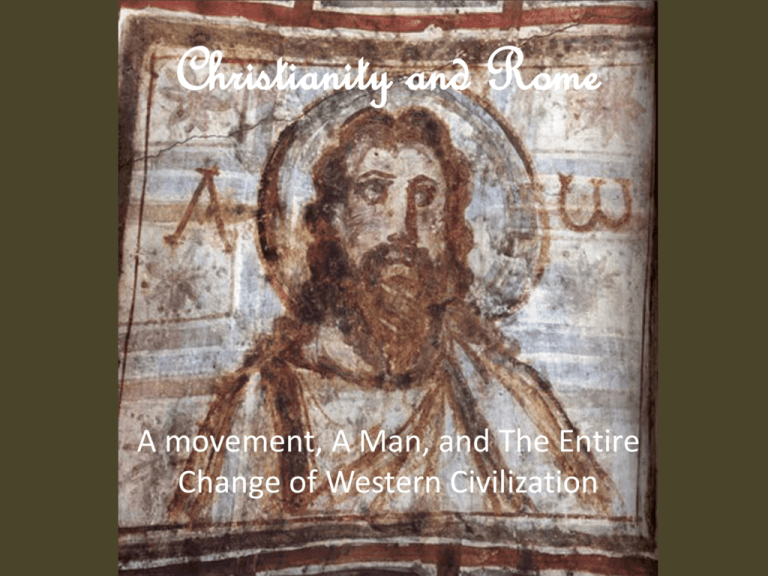
Christianity and Rome A movement, A Man, and The Entire Change of Western Civilization Judaism in the Roman Empire • By 6 AD the area of Judaea (the lands of the old Jewish kingdom of Judah) had fallen under Roman control. • There was unrest in Judaea, as some Jews wanted Roman influence and others did not. – Priestly Sadducees favored cooperation with Rome. – Scholarly Pharisees said their religious laws were above Roman laws. Judaea was a crucially important area of the Roman Empire due to coast access from the Mediterranean Sea and being a gateway between the Middle East and Asia. Judaism in the Roman Empire • Some Jews wanted to wait for • However, it was a few decades before God to save Israel from the revolt that a Jewish Rabbi (teacher) oppression. named Jesus had traveled through Judaea, spreading a message that would start a new movement within Judaism. • Other Jews, called Zealots, called for the violent overthrow of Roman rule. – Jewish revolt began in 66 AD – Romans crushed them in 70 AD – The Jewish Temple in Jerusalem was destroyed. Rise of Christianity • After reports that the man named Jesus had overcome his crucifixion, a new faith developed that focused on his teachings. • The people were called “Christians” because they believed the man to be Jesus Christ, the son of God and the Savior. – “Christos” in Greek means Messiah/Savior. Rise of Christianity • Jesus believed his mission was to complete the salvation that God promised to Israel. – “Do not think that I have come to abolish the Law or the Prophets; I have not come to abolish them but to fulfill them.” • Jesus emphasized the transformation of the inner person, and treating others with kindness, love, and understanding. Rise of Christianity • Jesus would cite verses from the Hebrew Bible. – “Love the Lord your God with all your heart…” • Jesus shared his concepts with other Jewish teachers. – Humility – Charity – Love toward others • His preaching caused controversy because some thought he was a revolutionary who would lead a revolt against Rome. • Jesus was then turned over to the Roman authorities, and the Roman official in charge of the area named Pontius Pilate ordered that Jesus be crucified. Statuary of Pontius Pilate Film portrayal of Pontius Pilate from “The Passion of the Christ” Crucifixion was a common practice in the Roman Empire was a way to torture and murder criminals or enemies. The bodies were left to hang as a reminder to the public about the values of the Roman Empire and to heed their actions. This is a Japanese crucifixion committed in the 1860s. This man was killed for murdering someone during a robbery. He was tied, rather than nailed. Rise of Christianity • After the death of Jesus, his followers proclaimed that he had risen from death and appeared to them. • They believed Jesus was the Messiah, the Savior of Israel who would bring peace, prosperity, and all-spreading love of God. The First Christians • Apostles (leaders) gained prominence in leading the spread of Christian faith. – Simon Peter & Paul – Paul delivered Christ’s message to Gentiles (non-Jews) too. • Paul taught that Jesus was the Son of God who came to save humanity from their sin. By accepting Jesus as the Savior, people could be saved from their sin. The First Christians • The followers of Christ recorded his teachings and later wrote the Gospels – the “good news” concerning Jesus. • These writings are the New Testament, which is the second part of the Christian Bible. • Most of the early Christians came from Jews and the Greek-speaking areas. Later Christianity spread to the Latin-speaking people. Roman Persecution • Christian values differed from the values of the Roman world. • In the beginning Rome did not pay much attention to Christianity, but their attitude changed. – Romans tolerated religions as long as they did not threaten the public order. – Many Romans came to view Christians as harmful to the state. • Christians also refused to worship the Roman gods and emperors. Roman Persecution • Jews had been allowed to not worship the Roman Gods, but this curtesy was not extended to Christianity. • Romans believed that such Christian defiance should be punished with death. – Romans began persecuting Christians under the reign of Nero (the same guy who killed his mother). – Nero blamed the Christians for a fire that destroyed much of Rome. • Christians were subjected to very hateful and cruel deaths, often times done in public for others to watch. The Strength of Christianity • Persecution of Christians did not stop the spread of the faith. In fact, it made it spread even more. • Christians began to organize themselves and their churches. – Bishops and clergy • Christianity grew quickly in the 1st century, took root in the 2nd century, and REALLY spread by the 3rd century. Why Did Christianity Spread? 1) The Christian message gave life a meaning and purpose beyond the things of reality, and it offered salvation and forgiveness. 2) It seemed familiar because it had teachings very similar to other religions. But it also offered a human to relate to, Jesus. o Also did not have to “pay” to be a Christian or belong to the Church. Why Did Christianity Spread? 3) Christianity fulfilled the human need to belong, and being unified with all believers regardless of money, background, or circumstance. • Christianity attracted people from all social classes, but especially from the poor and powerless. – Including women and slaves – “Christ is all, and is in all.” - Paul The Romans Adopt Christianity • Throughout the 3rd & 4th centuries (200s/300s) emperors continued persecutions of Christians. – Diocletian was the last great persecutionist. – However, Christians were too strong willed to be blotted out by force. • In 312, Emperor Constantine saw a vision of the Christian cross before a battle. – He won the battle and was convinced of the power of the Christian God. – 313: “Edict of Milan” proclaimed official tolerance of Christianity. • Under Theodosius the Great, Christianity was proclaimed the official religion of the Roman Empire. The Early Christian Church • The Christian church organized Bishops (leaders) to guide the major cities. • Soon one of them, the bishop of Rome, claimed that he was the leader of the entire western Christian Church. • The later bishops of Rome came to be known as “popes”. – “Papa” in Latin means father. Pope Francis The Early Christian Church • Although people accepted the pope as the head of the church, people did not agree on how much power the pope should have. • Pope Gregory I strengthened the papacy – how it related to other Christians and the government. The Early Christian Church • Monks and traveling missionaries were essential to spreading Christianity and converting nonChristians to the faith. – Monks are men who cut off their life from ordinary society and live in total dedication and purity to God. • Monks were required to: – – – – – – Meditate and pray Read the scriptures Worship Make schools for the young Housing for travelers Care for the sick
